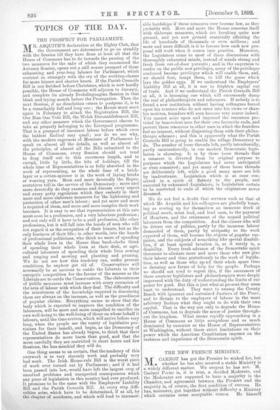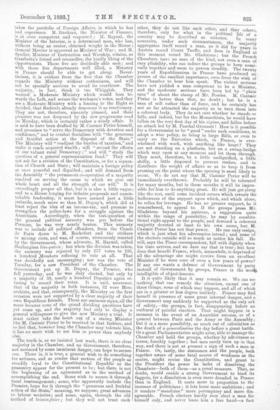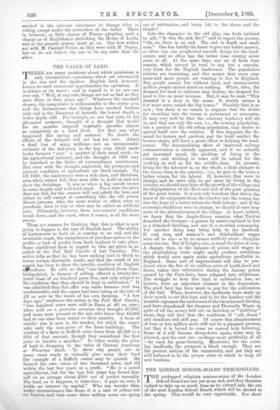THE NEW FRENCH MINISTRY.
MCARNOT has got the Premier he wished for, but whether he has also secured a stable Ministry is a widely different matter. We suspect he has not. M. Casimir Perier is, it is true, a decided Moderate, and the Moderates are supposed to have a, majority in the Chamber, and agreement between the Premier and the majority is, of cdurse, the first condition of success. He has, moreover, got together without difficulty a Ministry which contains some acceptable names. He himself takes the portfolio of Foreign Affairs, in which he has had experience. M. Burdeau, the Minister of Finance, is at once competent and respected ; M. Raynal, the Minister of the Interior, is a determined man, who has, without being an orator, obtained weight in the House ; General Mercier is approved as Minister of War ; and M. Spiffier, Minister of Instruction and Worship, retains, as Gambetta's friend. and counsellor, the kindly liking of the Opportunists. Those five are decidedly able men ; and with those five departments well filled, a Ministry in France should be able to get along. Never- theless, it is evident from the first that the Chamber regards the Ministry without enthusiasm, and will not be specially anxious to avoid its overthrow. The majority, in fact, think it too Whiggish. They wanted a Moderate Ministry which would lean to- wards the Left, and secure the workmen's votes, and they see a Moderate Ministry with a leaning to the Right so decided, that Radicals already denounce it as reactionary. They are not, therefore, sincerely plea,sed, and their pleasure was not deepened by the new programme read on Monday, which is certainly rather a windy affair. It is said to have been drafted by M. Casimir Perier himself, and promises to "serve the Democracy with devotion and confidence," and to combat Socialism with "the generous and fruitful action at the disposal of the State." The Ministry will "readjust the burden of taxation," and make it reach acquired wealth ; will "second the efforts of our valiant rural Democracy ;" and will "study the question of a general superannuation fund." They will not ask for a revision of the Constitution, or for a separa- tion of Church and State ; will maintain a foreign policy at once peaceful and. dignified ; and will demand from the Assembly "the permanent co-operation of a majority resolved on serving the cause to which we give our whole heart and. all the strength of our will." It is exceedingly proper all that, but it is also a little vague; and to a House longing for definite proposals and. unmis- takable leadership, it must have seemed just a little imbecile, much more so than M. Dupuy's, which did at least reject the idea of an income-tax, and. promise to strengthen the police-laws for a, struggle against the Anarchists. Accordingly, when the test-question of the general political amnesty was put before the Premier, he was very nearly beaten. This amnesty was to include all political offenders, from the Comte de Paris down to M. Rochefort and the strikers in mining riots, and was, of course, strenuously resisted by the Government, whose advocate, M. Raynal, called Boulangism lese-patrie ; but when the division was taken, the amnesty was rejected by only 257 votes to 226, a hundred Xembers refusing to vote at all. That was decidedly not encouraging ; nor was the vote of Tuesday, for a new President of the Chamber. The Government put up M. Dupuy, the Premier, who fell yesterday, and he was duly elected, but only by a 'majority of 38, nearly a hundred Deputies again re- fusing to record their votes. . It is said, moreover, that of the majority in both instances, 32 were Mon- archists, and. that, consequently, the Ministry on the first occasion were not supported by a clear majority of their own Republican friends. These are ominous signs, all the more because none of the grand dividing questions have yet come up, and the .majority had only to display a general willingness to give the new Ministry a trial. It must rather take the heart out of a strong Minister like M. Casimir Perier to be received in that fashion, and to feel that, however long the Chamber may tolerate him, it has no more wish to see him in power than anybody else.
The truth is, as we insisted last week, there is no clear majority in the Chamber, and no Government, therefore, not menaced by some imminent danger, can hope to secure one. There is, it is true, a general wish to do something for artisans, and so render that section of the people as steadily loyal to the Constitutional Republic as the peasantry appear for the present to be ; but there is not the beginning of an agreement as to the method of accomplishing the end. Some wish to secure it through fiscal rearrangement; some, who apparently include the Premier, hope for it through the "generous and fruitful action of the State," meaning, we suppose, great advances to labour societies ; and some, again, through the old method of laissez-faire ; but they will not trust each other, they do not like each other, and they cohere, therefore, only for what in the political life of a country may be described as minutes. In many countries, under such circumstances, the majority aggregates itself round a man, as it did for years in Austria round Count Taaffe, and does in England at this moment round Mr. Gladstone ; but the French Chambers have no man of the kind, not even a man of easy pliability, who can induce the groups to keep nomi- nally together and seem to govern steadily. The twenty years of Republicanism in France have produced no person of the smallest importance, even from the wish of the Chamber to hear him speak. The violent sections have not yielded a, man competent to be a Minister, and the moderate sections have been led by "plain men" of about the stamp of Mr. Fowler. M. Casimir Perier is better than that, no doubt ; but he is a. man of will rather than of force, and he certainly has not so far attracted the majority as to turn them into a coherent body. They do not care whether he stands or falls, and indeed, but for the Monarchists, he would have fallen on the very first day of his regime, and fallen before an attack led by M. Paschal Grousset ! How is it possible for a. Government to be "good" under such conditions, to adopt a wise policy, to bring in large Bills, or even to carry on the Executive which, in France, is over- whelmed. with work, with anything like heart? They are not standing on a platform, but on a swing-bridge which may open at any moment and let them through. They must, therefore, be a little undignified, a. little shifty, a. little disposed to prevent rushes, and to distribute the weight of affairs so as to keep it from pressing on the point where the opening is most likely to occur. We do not say that M. Casimir Perier will be immediately overthrown. Probably he will be tolerated for many months, but in those months it will be impos- sible for him to do anything great. He will just get along like the rest, until some incident occurs which reveals the hollowness of the support upon which, and which alone, he relies for leverage. He has no greater support, be it remembered, to appeal to. If the groups press Mr. Gladstone beyond his patience, a suggestion quite within the range of possibility, he may by constitu- tional right appeal to the people, and demand a, coherent majority devoted. at least to his own name, but M. Casimir Perier has not that power. He can only resign, which is just what his adversaries intend ; and none of the electors outside will so much as notice his fall. He will, says the Times correspondent, fall with dignity when his time arrives, and we dare say that is true ; but how does that benefit France, which, meanwhile, is deprived of all the advantage she might receive from an excellent Minister if he were sure of even a few years of power.? If any one wants a defence of Government by party instead of Government by groups, France is the mo4 intelligible of object-lessons.
It is quite likely that it may remain so. We can see nothing that can remedy the situation, except one of throe things, none of which may happen, and all of which are in a greater or less degree unlikely. France may find herself in presence of some great internal danger, and a Government may suddenly be supported as the only ark of safety,—the groups, in fact, disappearing before an outburst of painful emotion. That might happen in a moment in the event of an Anarchist success, or of a quarrel between Paris and the Army or the Assembly.; but it is a mere possibility, as much oat of calculation as. the death of a generalissimo the day before a great battle. Ore. great Parliamentarian might arise, able to manage the Chamber and hold the groups, whether by adroitness or terror, forcibly together ; but men rarely turn up in that way, and there is not at present a sign of such a man in France. Or, lastly, the statesmen and the people, both together aware of some fatal source of weakness at the centre, might revise the Constitution, and grant to the President the power he lacks of dissolving the Chambers—both of them—as a penal measure. That, no doubt, would enable a strong Government to bind its faggots, for a dissolution is even more dreaded in France than in England. It costs more in proportion to the incomes of politicians ; it lets loose more ambitions ; and it renders "mandates" more peremptory and. more dis- agreeable. French electors hardly ever elect a man for himself only, and never leave him a free hand—a 'fact marked in the extreme reluctance to change sides in voting, except under the protection of the ballot. There is, however, as little chance of France adopting such a change as of Englishmen abolishing the House of Lords, and so the present system must go on. Our best wishes are with M. Casimir Perier, as they were with M. Dupuy, but we do not believe the one to be any safer than the other.








































 Previous page
Previous page